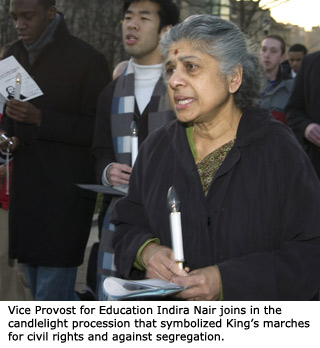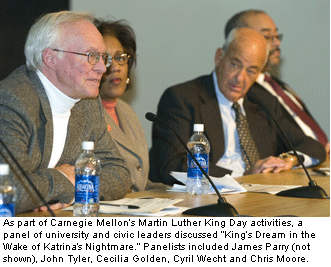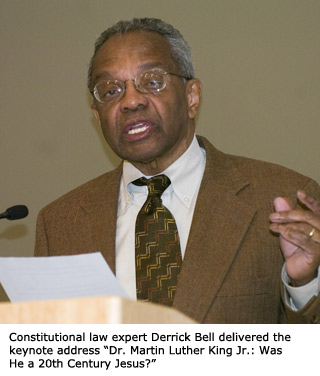Carnegie Mellon Celebrates King’s Life with Thoughtful Discussion and Dialogue
To most people, Martin Luther King Jr. Day creates a welcome three-day weekend that temporarily dispels January’s bleakness. Shopping malls and ski slopes jam with customers and amateur athletes enjoying their “day off.” But are those skiers and shoppers remembering King’s work and teachings? Probably not. Moguls and MasterCards don’t often bring to mind a great civil rights leader.

But Carnegie Mellon University annually puts Dr. King back into Dr. Martin Luther King Day, holding firm to the “a day on, not a day off” national theme for the holiday. Classes are held in the morning, but suspended in the afternoon and evening so students, faculty and staff can attend special programming on campus designed to encourage thoughtful dialogue on the late civil rights leader’s work.
“We do this out of deep respect for Dr. King, and we think the way we do it is especially meaningful and fitting,” said Carnegie Mellon President Jared L. Cohon. “And I think he would approve.”
Carnegie Mellon continued its “day on, not a day off” tradition on Jan. 16. President Cohon, chairman of the university’s Diversity Advisory Council (DAC), began the day’s events by discussing the university’s progress in building diversity on campus. He reported that Carnegie Mellon has one of the highest percentages of international undergraduate students among its peers. Female undergraduate enrollment is steadily increasing, and women made up 40 percent of the student body in 2005 (up from 32 percent 10 years ago). Tenure among female faculty members is showing “slow but steady” progress, and there has been a substantial increase in the number of female research faculty on campus.
Though the university showed progress in these areas, Cohon highlighted numerous areas for improvement, such as increasing the number of minorities in faculty and professional positions, and improving the representation of women in science, engineering and business. “Diversity, in all of the meanings of that word, is one of Carnegie Mellon’s strategic priorities,” Cohon wrote in the annual DAC report. “Through the efforts of the Diversity Advisory Council, and all the members of the university community, we will continue to become more diverse—and better.”
As part of his address, Cohon also presented the 2006 Barbara Lazarus Award for Culture and Climate to Associate Department Head and Modern Languages Professor Susan Polansky. Named for Barbara Lazarus, associate provost for academic affairs who died in 2003, the award is annually awarded to a faculty or staff member who has demonstrated extraordinary leadership and made a demonstrable impact on improving the culture and climate in the Carnegie Mellon community.

Following the president’s address, students from Carnegie Mellon and local high schools read narratives revealing their experiences with racial difference and discrimination as part of the university’s seventh annual Martin Luther King Jr. Writing Awards ceremony. The awards, sponsored by Carnegie Mellon's Creative Writing Program, present cash prizes to local high school and Carnegie Mellon students who submit poetry or prose about how race has impacted their lives.
After the awards, a panel of university and civic leaders discussed “King’s Dream in the Wake of Katrina’s Nightmare” in the Community Conversation. Led by moderator Everett Tademy, the university’s director of diversity and equal opportunity services, the panel included former Allegheny County Medical Examiner Cyril Wecht, YWCA of Greater Pittsburgh Chief Executive Officer Cecilia Golden, KDKA radio and "On Q" host Chris Moore, University of New Orleans Professor and Black Collegiate Magazine Editor James Perry, and Carnegie Mellon Interfaith Council member John Tyler. Panelists spoke on the effect race played in FEMA’s delayed response to hurricane victims and branched into a broader discussion of the roots and impact of racism. “There’s much work to do—that’s our challenge,” Tademy concluded.
Following the panel discussion, faculty, staff and students honored King’s commitment to non-violent protest with a candlelight procession that symbolized his own marches for civil rights and against segregation. The procession began at the university’s Purnell Center for the Arts and concluded in Rangos Hall in the University Center, where constitutional law expert Derrick Bell delivered the keynote address, “Dr. Martin Luther King Jr.: Was He a 20th Century Jesus?”
The first African American to receive tenure at Harvard University, Bell became the only academic to relinquish such a coveted position to protest Harvard Law School’s failure to appoint African American women. He has received six honorary degrees in the last decade and teaches constitutional law at the New York University School of Law. His seven books include the New York Times best-seller “Faces at the Bottom of the Well: The Permanence of Racism.”

In his address, Bell compared Jesus and King, noting that the latter’s inspiration came largely from the former’s teachings.
“While he hoped and prayed for victory in his work for racial and economic justice, King recognized a value of non-achievement of his goals. In one essay…King preached of the setbacks: the time he spent in jail…the dangerous character of his adversaries,” said Bell. “King knew those adversaries expected him to harden into a grim and desperate man. But he writes, ‘they fail, however, to perceive the sense of acclamation generated by the challenge of embracing struggle and surmounting obstacles.’
“That statement defines the spirit and the essence of what Jesus taught and what Dr. King manifested in his lifetime, urging by example for others to do the same,” Bell said. “King’s holiday could be a time—should be a time—less of commemoration and more of realization that in whatever ways we can, we should continue his work in the spirit of his life.”
Related Links:
Martin Luther King Jr. Writing Awards
Diversity Resource Guide
Polanksy Wins Barbara Lazarus Award



